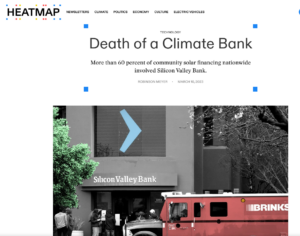https://heatmap.news/technology/svb-climate-tech-bank
Via Heatmap: ROBINSON MEYER
The United States witnessed its largest bank failure since 2008 on Friday, as Silicon Valley Bank ran out of cash and was taken over by the Federal Deposit Insurance Corporation.
True to its name, the bank was central to the technology ecosystem and Northern California economy; it claimed half of the country’s venture-backed startups as customers.
But what hasn’t received as much attention is that Silicon Valley Bank was particularly important to the climate-tech sector.
“Silicon Valley Bank was an integral part of the early-stage climate tech community and I hope that they survive in some form to continue that role,” Gabriel Kra, a managing director at Prelude Ventures, told me on Friday.
Silicon Valley Bank served as a banker to dozens of climate and energy-tech companies, holding their cash on a day-to-day basis and issuing billions of dollars in loans in support of the type of large-scale, one-off projects that are essential to the sector.
The bank’s website bragged about its particular support of solar, hydrogen, and energy-storage companies. It provided more than half a billion dollars in revolving credit to Sunrun, the country’s largest residential solar company. (Sunrun did not respond to a request for comment by press time.)
And more than 60 percent of community solar financing nationwide involved SVB in some capacity, the bank claimed on its website.
The bank also published influential annual reports on the climate-tech sector, and it sponsored events for climate VCs and startups — including one at the Lake Tahoe Ritz Carlton as recently as last week.
“They were careful, thoughtful, and willing lenders to early-stage companies,” Kra said. “As a bank, they were focused on that segment of the ecosystem and they understood the risks they were taking more than a bank that wasn’t focused.”
…
End excerpt:
"Build back better" turned into a recession, skyrocketing gas and grocery prices, the second-largest bank collapse in US history, and a $100 billion proxy war with nuclear-armed Russia. pic.twitter.com/0rlmU1ifKR
— KanekoaTheGreat (@KanekoaTheGreat) March 12, 2023
Tony Heller video below:



